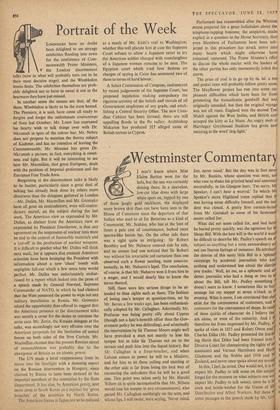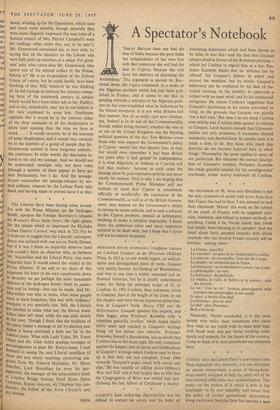Westminster Commentar
DON'T know where Miss Elaine Burton went for the hols, but the sun was certainly shining there. In a sleeveless, low-cut blue dress with large white spots on, topped by one of those jangly gold necklaces, she displayed more brown skin than can have been 'seen in the House of Commons since the departure of that Indian who used to sit for Battersea as a kind of Communist. Mr. Jenkins, who has at the best of times a pale cast of countenance, looked most spectre-like beside her. On the other side , there was a sight quite as intriguing : Sir Robert Boothby and Mr. Nabarro entered side by side, and no sooner had one noticed that Sir Robert was without his invariable red carnation than one observed such a flower nestling, most unaccus- tomedly, in Mr. Nabarro's lapel. The conclusion, of course, is that Mr. Nabarro won it from him in a wager, and I would dearly like to know the terms thereof.
Still, there were less serious things to be at- tended to than sights such as these. The fashion of losing one's temper at question-time, set by Mr. Bevan a few weeks ago, has been enthusiasti- cally adopted by Mr. Callaghan. Admittedly Mr. Profumo was being pretty silly about Cyprus (though not a hair's-breadth sillier than the Gov- ernment policy he was defending), and admittedly the intervention by Sir Thomas Moore might well have provoked a man not merely to lose his temper but to take Sir Thomas out on to the terrace and push him into the liquid history. But Mr. Callaghan is a front-bencher, and when Labour comes to power he will be a Minister, and for him to sit there yelling and snarling at the other side is far from being the best way of reassuring the onlookers that he will be a good one. This point was taken early by Mr. Harold Wilson (it is quite inconceivable that Mr. Nilson would lose his temper in any circumstances), who patted Mr. Callaghan soothingly on the arm, and whose lips, I will swear, were saying, 'Never mind, Jim, never mind.' But the day was in fact savi by Mr. Rankin, whose question was next, ai who rose to shake his grizzled head and announ mournfully, in his Glasgow burr, 'I'm sorry, M Speaker, I can't hear a wurrrd.' To which M Speaker's more Highland tones replied that I was having some difficulty himself, and the inc dent was closed. A pretty firm curtain-lectu from Mr. Gaitskell to some of his lieutenan seems called for.
What did not seem called for, and had bett be buried pretty quickly, was the agitation for ti Shops Bill. With the best will in the world it woul be difficult to describe Mr. Padley's speech on ti subject as anything but a most extraordinary at not too literate farrago of nonsense. He attribute the demise of this nasty little Bill to a 'splenet campaign by academic journalists 'who kne' nothing and understood less about the distribs tive trades.' Well, let me, as a splenetic and act demic journalist who had a thing or two to so about the Bill, tell Mr.. Padley something 0 doesn't seem to know. I sometimes like to buY sausage for my supper at seven o'clock in evening. What is more, I am convinced that shol exist for the convenience of customers, and customers for the convenience of shops. In neit of these quirks of character do I believe that am alone, or even of the minority. And I therefore far from impressed by Mr. Padley, spoke of riots in 1825 and Robert Owen and Charles Dilke (Mr. Padley presented the fasci ing thesis that Dilke had been framed into 1 Divorce Court for championing the rights of sh assistants) and Vernon Hartshorn and Her Gladstone and the Webbs and 1918 and 14 Zealand, and never once spoke about my sausa In this, I feel, he erred. One would not, it is tril expect Mr. Padley to talk sense on this subject forget for the moment on what subjects one wa, expect Mr. Padley to talk sense), since he is h cook and bottle-washer for the Union of Sh Distributive and Allied Workers. But there some passages in the speech made by Mr.'Gr. wood, winding up for the Opposition, which were not much more sensible, though naturally they were more elegantly expressed (his neat echo of a famous remark of Mrs. Patrick Campbell's went for nothing—what mutts they are, to be sure!). Mr. Greenwood astonished me, to start with, by' saying that all the speakers on the Labour side were fully paid-up members of a union. For good- ness' sake, what union does Mr. Greenwood, who sports one of the whitest collars in the House, belong to? He is an ex-president of the Oxford Union, of course, but he could hardly have been thinking of that. Still, whatever he was thinking of, he did manage to mention the chimney-sweep- ing boys of the nineteenth century (a subject which would have been better left to Mr. Padley), and to say, remarkably, that 'we do not believe in the view expressed by some hon. Gentlemen opposite that it would be in the interests either of the shop assistants or of the shopkeepers to allow later opening than the time we have in mind. . . .' It would certainly be in the interests of some shopkeepers, and it would very certainly be in the interests of a group of people that Mr. Greenwood seemed to have forgotten entirely : the customers. In other words, the discussion re- turns to me and my sausage. And we should not be underrated; sausages may not have votes (though a number of them appear to have got into Parliament), but I do. And the sausage- buyers outnumber the sausage-refusers by sev- eral millions; whereat let the Labour Party take heed, and having made its protest leave it at that.
The Liberals have been having some to-and- fro with the Prime Minister on the hydrogen bomb, apropos the Foreign Secretary's remarks on Woman's Hour (now there's the right sphere for the talents which so impressed the Hoylake Urban District Council 'way back in '32). Far be it from me to suggest that the Liberals' correspon- dence was initiated with one eye on North Dorset, but if it was I think an impartial observer (and You couldn't have an observer who, as between Mr. Macmillan and the Liberal ,Party, was more Impartial than I) would award the verdict to the Prime Minister. If we add to his share of this argument his letter to his own constituents down in Bromley we get perhaps ,the most reasonable defence of the hydrogen bomb—both its posses- sion and its testing—that can be made. And Mr. Macmillan was wise to stress, what some people seem to have forgotten, that war with 'ordinary' weapons is not precisely fun. Still, the Liberals are entitled to make what hay the Dorset weed- killers have left them, while the sun sinks slowly iii the west. Though I think that the tradition of the party leader's message to his by-election can- didate is being stretched a little too far in the Liberal cause. What with Lady Violet, Mr. Frank OWen and Mr. John Arlott sending messages of encouragement to poor Mr. Emlyn-Jones, I look forward to seeing the next Liberal candidate (if there are any more) receiving comforting tele- grams from Mr. Edward Malindine, Mr. Oliver Smedley, Lord Moynihan (or even his heir- apparent), the manager of the tobacconist's kiosk at London Bridge Station, Nevil Shute, Denis Compton, Eunice Gayson, six Clapham bus con- ductors, the Editor of the News Chronicle and Illy mother.
TAPER



































 Previous page
Previous page